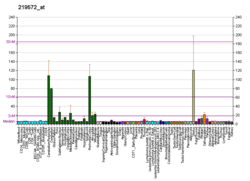CADPS2
Calcium-dependent secretion activator 2 is a protein that in humans is encoded by the CADPS2 gene.[3]
Function
This gene encodes a member of the calcium-dependent activator of secretion (CAPS) protein family, which are calcium-binding proteins that regulate the exocytosis of synaptic and dense-core vesicles in neurons and neuroendocrine cells.[3]
Interactions
This gene interacts with brain-derived neurotrophic factor.
Clinical significance
Cadps2 has been linked to autism[4] and is in the 7q autism susceptibility locus (AUTS1). However, the finding of aberrant CADPS2 splicing was not found to be significant in another study.[5]
A knockout mouse model was found to have autistic-like characteristics.[4]
CADPS2 has been linked to human and mouse brain structure in two large genomic studies.[6][7]
References
- ↑ "Human PubMed Reference:".
- ↑ "Mouse PubMed Reference:".
- 1 2 "Entrez Gene: CADPS2 Ca2+-dependent activator protein for secretion 2". National Center for Biotechnology Information.
- 1 2 Sadakata, T; Washida, M; Iwayama, Y; et al. (2007). "Autistic-like phenotypes in Cadps2-knockout mice and aberrant CADPS2 splicing in autistic patients". Journal of Clinical Investigation. 117 (4): 931–43. PMC 1821065
 . PMID 17380209. doi:10.1172/JCI29031.
. PMID 17380209. doi:10.1172/JCI29031. - ↑ Eran, Alal; Graham, Kaitlin R.; Vatalaro, Kayla; et al. (April 2009). "Comment on "Autistic-like phenotypes in Cadps2-knockout mice and aberrant CADPS2 splicing in autistic patients"". Journal of Clinical Investigation. 119 (4): 679–80. PMC 2662571
 . PMID 19339759. doi:10.1172/JCI38620.
. PMID 19339759. doi:10.1172/JCI38620. - ↑ French, L.; Pavlidis, P. (6 January 2011). "Relationships between gene expression and brain wiring in the adult rodent brain". PLoS Computational Biology. 7 (1): e1001049. PMC 3017102
 . PMID 21253556. doi:10.1371/journal.pcbi.1001049.
. PMID 21253556. doi:10.1371/journal.pcbi.1001049. - ↑ Stein, JL; Hua, X; Lee, S; et al. (15 November 2010). "Voxelwise genome-wide association study (vGWAS)". NeuroImage. 53 (3): 1160–74. PMC 2900429
 . PMID 20171287. doi:10.1016/j.neuroimage.2010.02.032.
. PMID 20171287. doi:10.1016/j.neuroimage.2010.02.032.
External links
- Human CADPS2 genome location and CADPS2 gene details page in the UCSC Genome Browser.
Further reading
- Nagase T, Kikuno R, Nakayama M, et al. (2001). "Prediction of the coding sequences of unidentified human genes. XVIII. The complete sequences of 100 new cDNA clones from brain which code for large proteins in vitro". DNA Res. 7 (4): 273–81. PMID 10997877. doi:10.1093/dnares/7.4.271.
- Nakayama M, Kikuno R, Ohara O (2003). "Protein-protein interactions between large proteins: two-hybrid screening using a functionally classified library composed of long cDNAs". Genome Res. 12 (11): 1773–84. PMC 187542
 . PMID 12421765. doi:10.1101/gr.406902.
. PMID 12421765. doi:10.1101/gr.406902. - Strausberg RL, Feingold EA, Grouse LH, et al. (2003). "Generation and initial analysis of more than 15,000 full-length human and mouse cDNA sequences". Proc. Natl. Acad. Sci. U.S.A. 99 (26): 16899–903. PMC 139241
 . PMID 12477932. doi:10.1073/pnas.242603899.
. PMID 12477932. doi:10.1073/pnas.242603899. - Cisternas FA, Vincent JB, Scherer SW, Ray PN (2003). "Cloning and characterization of human CADPS and CADPS2, new members of the Ca2+-dependent activator for secretion protein family". Genomics. 81 (3): 279–91. PMID 12659812. doi:10.1016/S0888-7543(02)00040-X.
- Speidel D, Varoqueaux F, Enk C, et al. (2004). "A family of Ca2+-dependent activator proteins for secretion: comparative analysis of structure, expression, localization, and function". J. Biol. Chem. 278 (52): 52802–9. PMID 14530279. doi:10.1074/jbc.M304727200.
- Ota T, Suzuki Y, Nishikawa T, et al. (2004). "Complete sequencing and characterization of 21,243 full-length human cDNAs". Nat. Genet. 36 (1): 40–5. PMID 14702039. doi:10.1038/ng1285.
- Gerhard DS, Wagner L, Feingold EA, et al. (2004). "The status, quality, and expansion of the NIH full-length cDNA project: the Mammalian Gene Collection (MGC)". Genome Res. 14 (10B): 2121–7. PMC 528928
 . PMID 15489334. doi:10.1101/gr.2596504.
. PMID 15489334. doi:10.1101/gr.2596504. - Binda AV, Kabbani N, Levenson R (2005). "Regulation of dense core vesicle release from PC12 cells by interaction between the D2 dopamine receptor and calcium-dependent activator protein for secretion (CAPS)". Biochem. Pharmacol. 69 (10): 1451–61. PMID 15857609. doi:10.1016/j.bcp.2005.02.015.
- Kimura K, Wakamatsu A, Suzuki Y, et al. (2006). "Diversification of transcriptional modulation: large-scale identification and characterization of putative alternative promoters of human genes". Genome Res. 16 (1): 55–65. PMC 1356129
 . PMID 16344560. doi:10.1101/gr.4039406.
. PMID 16344560. doi:10.1101/gr.4039406.
This article incorporates text from the United States National Library of Medicine, which is in the public domain.
